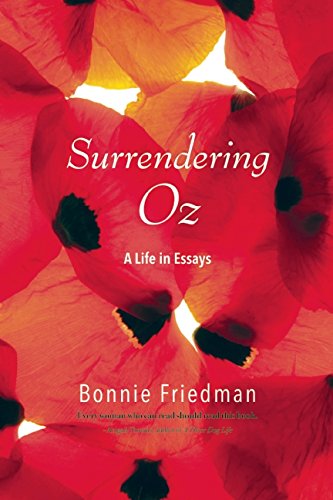
What the Wicked Witch Taught Her
But there is something else in the movie, beyond this, that I think speaks directly to the Jewish experience. I wrote the essay because I felt ambivalent and even guilty about leaving home. I worried about abandoning my parents, although my brothers did not. They left, married, and had kids. I think many Bronx daughters were taught not to leave home, not to go on adventures, but to stay close and caretake. That’s what a good daughter did. Many of the Bronx girls I grew up with never married. We didn’t have children. And I think my essay about The Wizard of Oz helps explain why we made this choice.
YZM: In the essay titled The Watcher, you describe the experience of coming more fully to life while visiting the graves of relatives; can you explain that paradox?
BF: I used to be very good at living in a kind of dream state. I could put off from one day to another and even one year to another dealing with uncomfortable realities, out of a desire to spare the feelings of others, and out of terror of losing what was comfortable in my life. Going to the cemetery – seeing relatives’ graves, including my own sister’s – infused me with a sense of how brief life is, and that I must make the most of my own. It isn’t an intellectual realization – we all know about mortality – but an emotional one. I had to take more risks. I had to grab hold of my own opportunities. An urgency came over me that was thrilling and that let me take chances that allowed me to grow. I tried to get this experience into the essay. To let the reader feel some of the optimism and lightness and nerve and urgency I felt from that cemetery trip.
YZM: In that same essay, you describe an argument between your parents; your father is more of a believer than your mother. Did your mother’s skepticism affect your own faith? Or was it your father’s spiritual leanings?
BF: I do have my father’s spiritual leanings, but I can only envy him his assurance that God exists. In some way I stand between the two extremes that my parents embody, as I think many Jews do. It’s an odd truth that it’s possible to be a good Jew without being sure that God exists. Our spiritual feeling stems from the morality of daily life and the sense of blessedness of ordinary things – the raspberries that we buy in Key Food, the gingko leaves on the street corner tree lit up like yellow fans. This is why so many of us feel an affinity with Buddhism, with its emphasis on the present moment.
My mother is far more of a skeptic than I am. Hers is an almost stony clear-sightedness and acceptance about the lack of an afterlife, even though she is in her nineties. She believes this is it, the life we have here right now. And, oddly, she’s more of an optimist than my father. She’s committed to savoring this life. My father believes with a rock-solid belief that God exists, but by nature he’s more morose. His faith doesn’t provide him great comfort, that I can see, perhaps because he believes, as most Jews do, that there is no afterlife. In that my parents are in agreement. I myself am like many relatively non-practicing Jews that I know: feeling that something sacred infuses our lives but finding what exactly this is somewhat irreducible and unparaphrasable. As with many Jews, literature and the arts became my shul.
YZM: You write: “…a person wants rabbis to be as cogent as professors, able to prove intellectually what must be true, their refinement itself an argument for the spirit world.”
BF: In the synagogue I grew up in, the rabbi was a scholar. It was Irving Greenberg, and his sermons were glories of gentle thoughtfulness, intricate luminous marvels of abstract ideation – or so they seemed to me, as a high school student. But all the rabbis of my Bronx youth were that way – in my friends’ synagogues and temples, the rabbis were the same: cerebral, even literary. These were big, prosperous synagogues that could be rather choosy about who their rabbi would be, and they wanted men who pleased on myriad levels.
It never occurred to me until I moved to Iowa and the rabbi of our tiny, local shul was a rough-hewn but more actually demonstrative and passionate-seeming person that religious feeling wasn’t an idea but a conviction. I discovered a retrospective wistfulness that ideas themselves don’t get you to God – at least for me they don’t. No proof is sufficient if you don’t also have something else. I think I wished that God could be deduced, Q.E.D. But of course He or She can’t. And I found the more visceral, demonstrative rabbi a good corrective. The rabbi that my sister had at the end of her life, the rabbi in Beth Abraham Hospital, was not a professor type, but what a charisma, what a force. He taught me that I’d been confused about what makes for spiritual leadership. He opened my eyes to a more full-bodied spirituality.
YZM: Your essays are so often suffused with a kind of secular holiness in which even the most mundane details or objects can be made to seem sacred, such as “…the cockeyed ungainly clutch purse that I’d knitted…its mother-of-pearl oculous button, its yellow-wheat hue, its lining that my mother had sewn in, its hatchet shape, its memory of stitches appearing that had been conjured by my own fingers, a texture accumulating…” Do you consider this quality an expression of religious feeling or faith?
BF: Absolutely.
One comment on “What the Wicked Witch Taught Her”
Comments are closed.




Great interview, bringing out that secularism and spirtuality are not mutually exclusive. I look forward to reading Surrendering Oz.